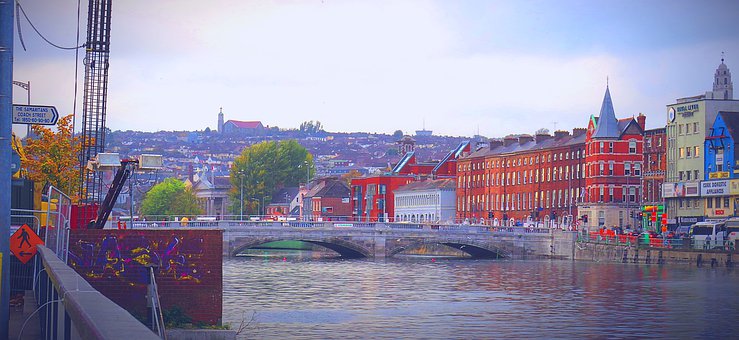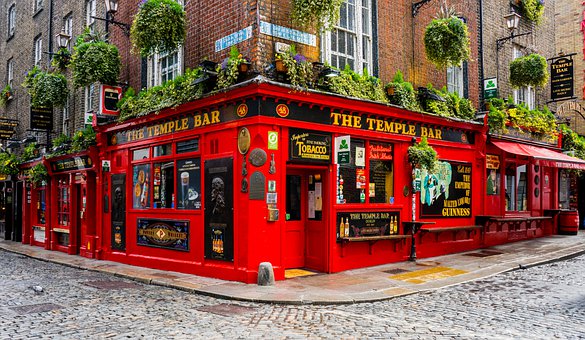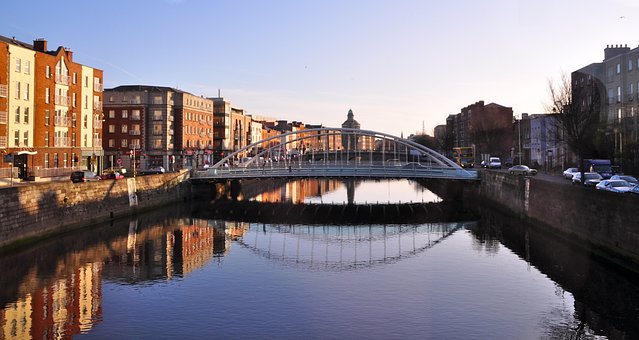Poblacht na hÉireann or, as we know in English, the Republic of Ireland, is a country better known as Ireland.
If you live in Ireland, you are Irish.
The country uses the euro and speaks Irish and English as the official languages.
Beer, though, is the language that everyone in Ireland speaks the best.
Find out more about Guinness, Irish ballads, and other reasons why people love and abhor Ireland and living on this island of a country.

Contents
Pros of Living in Ireland
1. The Landscape
The Cliffs of Moher, the Atlantic Ocean, the Irish Sea, River Shannon, and Mount Brandon are some of the most striking landscapes to see while in Ireland.
Spend time hiking the MacGillycuddy’s Reeks mountain range.
The Reeks have 27 mountains straggled along the oceanside cliffs.
The highest peak in the range is Carrauntoohil, where the most popular trail to hike is the Devil’s Ladder.
At 3,407 feet, this is the tallest mountain in Ireland.
2. Irish Cottage Pie Vs. English Shepherd’s Pie
Yes, it’s true the English invented Shepherd’s Pie, with the use of lamb meat for the ground mince topped with English peas and potato mash.
However, in neighboring Ireland, the Irish cottage pie is just as toothsome.
In a traditional Irish cottage pie, the biggest difference, according to Jamie Oliver, is the meat.
Cottage pie uses ground beef instead of minced lamb.
Other ingredients that go well in an Irish cottage pie are Guinness beer and Worcestershire sauce originating in Worcestershire, Worcester, England.
3. Guinness in Ireland and Other Stouts
Guinness hails from Ireland and is a world-famous beer, established in 1759 at St. James’s Gate Brewery, now owned by Diageo.
If you live in Dublin, you must visit the Guinness Brewery and Storehouse for a tour at the Gravity Bar.
Have a pint or three and you will be singing an Irish ballad before you can see straight!
Guinness is, after all, the most popular beer in Ireland.
Other types of alcohol brewed in Ireland include Murphy’s Irish Stout, O’Hara’s Irish Stout, and Kilkenny Irish Cream Ale.
4. Irish Pubs
Along the lines of alcohol is the quintessential experience of eating and drinking at an Irish pub.
Ain’t anything else like it if you live in Ireland!
The Brazen Head, which was founded in the 12th century, is one of Dublin’s oldest pubs.
The oldest Irish pub is Sean’s Bar, dating all the way to 900 AD and located on the River Shannon.
Wine Mag reports, “Sean’s Bar could be the oldest operating pub on the planet.”
The Red Lion is one of the most popular pub chains with over 500 locations.
Going to a pub means eating some Irish food while gulping down an Irish beer.
You might also watch Irish sports teams play Rugby on the telly or listen to a live Irish cover band of The Cranberries perform.
5. The UK and London
If you are into the Royal Family and the United Kingdom culture, Ireland is right next door.
A quick hop over by land and by sea, for a travel time of 10 hours, gets you from the center of Ireland to London, England.
Also, forget a passport.
Irish travelers only need an ID to get to London.
You can tour the Tower of London, take a ride on the London Eye, and shop at Harrods luxury department store.
Eat some fish and chips with malt vinegar before grabbing a late-night Jack the Ripper or Sherlock Holmes tour.
6. St. Patrick’s Day
Being in Ireland for St. Patrick’s Day is the best way to celebrate the world’s biggest party holiday.
St. Patrick’s Day, also known as St. Paddy’s Day is held on March 17th.
This popular Irish holiday features all things green.
Shamrocks are the raging floral and everyone drinks beer, preferably Irish and in a green cup–if not actual green beer.
Parades and parties are held, particularly on riverfronts where the river waters are customarily tinted green, such as River Liffey in Dublin.
By the way, dying the river green is actually an American custom coming from Chicago.
And also, you might be wearing orange if you live in Liverpool, Ireland, in particular.
The Protestants in the country wear orange instead of green on St. Patrick’s Day.
7. Faeries and Other Ancient Irish Creatures
Yes, the Irish believe in faeries or Celtic fae similar to elves called Aos si, and leprechauns, which are Irish fairies.
All of these are involved in bringing luck and magical powers.
Locals plant fairy trees to attract Irish fairies, and the story goes that when the tree dies, so does the fairy and maybe the homeowner.
Therefore, it is a risky business to plant a tree to grow for a fairy.
On St. Patrick’s Day, you may be specifically keen to see if you spot a green leprechaun out searching for its own gold–beer.
8. Irish Ballads
Tom Lehrer, Van Morrison, Aloys Fleishman, and Ruaidri Dáll Ó Catháin and hits like “Danny Boy” and “Carrickfergus”… are the names all Irishmen and Irishwomen know like the back of their hands.
The self-titled ballad, “Irish Ballad,” is particularly dark and gruesome, and can be seen as a poem.
For musicians and those who are interested in folk music, especially Irish music, this small island country is the best place to find it naturally!
Discover the latest Irish bands and enjoy live Irish music at local pubs as you savor those pints of Guinness.
9. High Quality of Life
Ireland is among the best countries to live in worldwide based simply on the quality of living the country provides its residents.
It is a leader in developed, free countries, and the quality of healthcare is highly prized.
The country was recognized as the first on the Good Country index by Travel + Leisure, as well.
Plus, there are just 5.1 million people living on more than 27,000 square feet of land.
There are far fewer residents than California at 39 million people, and that is only a state!
Cons of Living in Ireland
1. Everyone Drinks Heavily
The alcohol consumption before COVID-19 was 44 percent of Irish adults over 18 drinking at least once weekly.
Additionally, the Irish drink an average of 10 liters of alcohol annually.
If you are not into alcohol or suffer from alcoholism, Ireland might prove to be problematic.
2. Island Isolation
When you live on the island of Ireland, you are living isolated from the rest of the European mainland and even Great Britain.
Island isolation can be hard to cope with if you are from the US and used to road tripping.
Finding somewhere new to go while still in Ireland can also be a challenge if you enjoy traveling.
3. The Troubles
The Troubles were a 30-year war that raged between Northern Ireland and the Republic of Ireland.
More than 3,500 people were murdered as a result of the Troubles, which originated as a Londonderry civil rights march.
According to Brittanica, the Troubles resulted in “the Anglo-Irish Treaty that ended the War of Independence then created the Irish Free State in the south, giving it dominion status within the British Empire.”
4. Housing Market is Competitive
According to InterNations regarding renting and buying homes in Ireland, the market is fairly competitive.
Apartments are also more expensive in Ireland compared to other European countries.
Also, foreigners have to prove that they will be able to afford to legally live in the country for at least one year.
You can get this from an employer or bank referring to your financial ability to afford to house.
The average cost of rent in Ireland is 1,400 EUR for a month, which is equivalent to $1,550 USD.
5. Leprechauns
The leprechaun is a key figure in Irish folklore.
Also called leprecauns or lepracauns, the word comes from luchorpan, which is Old Irish meaning little body.
These characters are fairies who are, characteristically, older males.
Leprechauns wear a cocked hat and leather apron, and, according to Encyclopedia Britannica, are solitary shoemakers.
Known as tricksters, the leprechaun is mysterious and mischievous–and very much in search of treasure that glitters like gold.
If you see a leprechaun, you are most likely in Ireland, but they may be found worldwide.
If you live in Ireland, you might have to battle with a leprechaun as a foe, which could prove your undoing.
Just another reason why you might not want to live in Ireland.
By the way, supposedly the locals do not like talking about these wee little folk too much.
Maybe they are leprechauns themselves, or maybe they are afraid you are!
6. Weather
Earthquakes and thunderstorms are rare in Ireland, so if you are into storm chasing, forget about finding any wild weather here.
However, if you are going to live in Dublin, Derry, Cork, or Kerry, you had best prepare for the oceanic climate.
Living by the ocean means it is going to be wet.
Rain is frequent and so are winds from the ocean, which bring in ocean mists.
Winters are mild and see occasional snowfall and ground cover, but cold waves are infrequent due to the ocean currents.
Summers average a range of 60 to 70 degrees Fahrenheit, so forget about bikini weather even though you likely live on the coast.
7. Ireland Versus the UK
Ireland and the United Kingdom are two different places.
Yet, often, outsiders are confused about what the United Kingdom is and how Ireland is part of this, or if Ireland is in the UK at all.
The United Kingdom makes up four countries–Wales, Ireland, Scotland, and England.
Then you have Great Britain, which includes Scotland, Wales, Northern Ireland, and England.
Ireland, aka the Republic of Ireland, is not part of Great Britain.
Also, Northern Ireland and the Republic of Ireland make up the entire country and the island that is Ireland.
Now, have a pint and try to explain this to your folks back home when you move to Ireland–it is enough to make you move back!
8. Orange Versus Green
Protestants wear orange on St. Patrick’s Day when the rest of the world wears green.
That should tell you everything you need to know about this country.
St. Patrick’s Day is an Irish holiday, after all.
This has to do with the Orange Order, William of Orange, and the 1690s.
In short order, Catholics wear green and so does everyone else on St. Paddy’s Day–but the Protestants who are against the Catholics and in the Orange Order–thus they wear orange.

Pros and Cons of Living in Ireland – Summary Table
| Pros of Living in Ireland | Cons of Living in Ireland |
|---|---|
| 1.The Landscape | 1.Everyone Drinks Heavily |
| 2. Irish Cottage Pie Vs. English Shepherd’s Pie | 2. Island Isolation |
| 3. Guinness in Ireland and Other Stouts | 3. The Troubles |
| 4. Irish Pubs | 4. Housing Market is Competitive |
| 5. The UK and London | 5. Leprechauns |
| 6. St. Patrick’s Day | 6. Weather |
| 7. Faeries and Other Ancient Irish Creatures | 7. Ireland Versus the UK |
| 8. Irish Ballads | 8. Orange Versus Green |
| 9. High Quality of Life |
Ireland Safety Overview
READ THE FULL REPORT: Ireland Safety Review
Safety Index:
- OVERALL RISK: LOW
- TRANSPORT & TAXIS RISK: LOW
- PICKPOCKETS RISK: MEDIUM
- NATURAL DISASTERS RISK: LOW
- MUGGING RISK: MEDIUM
- TERRORISM RISK: MEDIUM
- SCAMS RISK: LOW
- WOMEN TRAVELERS RISK: LOW
Frequently Asked Questions
What is the largest city in Ireland?
Dublin is the largest city in Ireland with more than 1 million people.
What is the biggest religion in Ireland?
Christianity, which includes both Catholicism and Protestantism, is the largest religion in the Republic of Ireland.
Nearly four-fifths of these people are also Roman Catholic.
What languages are spoken in Ireland?
English and Irish Gaelic are the primary languages spoken in Ireland.
More than 50 percent speak English and 17 percent speak Irish Gaelic.
Nearly 11 percent speak French!
Does it rain a lot in Ireland?
Yes, most days you will get rain in Ireland, especially in coastal cities like Dublin.
What is football called in Ireland?
Gaelic football (GAA) and is one of the most loved sports in the country.
In Irish, this translates as Peil Ghaelach or simply Peil.
Similar to soccer and futbol and American football, there are two teams and a rectangular grass field.
In the Irish version, each team wants to get the ball, which is round in this sport.












I AM MOVING IMMEDIATELY
I want go there this country is my dream country.
Same here. I have wanted to go there since forever and I am doing a research slideshow RIGHT NOW.
Im moving to ireland too be alone and die alone because the world is so judgemental
Hang in there, buddy!
lets move there together buddy
Ignore the world/judgment of people. Those that judge are usually the ones that have the most to hide
im looking at moving once i get out of school and considering i want to be a bartender looks like im gonna be making a decent amount of money
Ireland is one of the most expensive countries in Europe and The World. Very high rental costs, very high income tax and high sales tax, High homelessness, High unemployment, High crime. It has been described as over-rated, over-stated, over-priced and over-hyped. Poor quality of living, poor social standards (Ireland is famous for foul language, rude cursing and toilet mouthing). Add the fact that it is a non-pluralist theocracy noted for physical, sexual and psychological abuses by the Catholic Church who still retain high earnings from charities, property and land. High corruption is also a factor. With a papal nuncio (funded by the people) near the Presidents park, and funds transferred out tax-free at the expense of the Irish taxpayer. Poor Government and poor management has led to a sort of sub-Vatican state which is really run by a Curial Caste. Wettest country in Europe, it rains frequently with only c 21% of usable rain-free days. Tourist campaigns are high and often misleading depicting it as leafy green ireland. A high drug problem and a high crime rate have left Ireland in the lowest leagues of Europe. Live prices as of 2023 if you visit Galway City, you pay over $150/night (well over £100) for substandard accommodation. Flat rental city centre costs almost €2,000 per month (see daft.ie). Dinner for two and a bottle of wine costs over €100 on shop street and over €200 peak season. Car rental most expensive in Europe and so on. It is sad that such a place is infested by high prices, theocratic mis-management and foul language. I am Irish and more-than-qualified to comment on a country that used be somewhat OK to visit and live in. Sadly, no more. There are at least 40 other countries in Europe worth more visiting, and You wont have to listen to the cursing, toilet mouths and dysfunctional shenanigans. Summary… OVER RATED, OVER STATED, OVER PRICED & OVER HYPED.
so sad to read your arguments, lived there over the last 8 years, it got worse with time unfortunately. I hope some changes in good will take place🤞
This comment is inaccurate in many aspects. For example Ireland has its historically lowest unemployment rate at present, around 3%.
Ireland is one of the safest countries in the world. Do your research. The fact that the people drinks a lot does not mean high crimes.
can you tell me more about it from ur personal experience? im deciding of moving there
Hi, I’m interested in moving to Ireland and I guess I need all the caveats I can get. What’s my best shot for employment and a place to live there, as a non-wealthy Canadian?
Jesus Seamus don’t hold bsck
Ireland is a rip off. Be very careful.
Great Britain is an island consisting of England, Wales, and Scotland. The UK consists of Great Britain and Northern Ireland. Ireland is a separate country from the United Kingdom.
Correct!
Any country is WHAT YOU MAKE FOR YOURSELF ‘THERE’, EIRE IS STILL PORICUAL/ WHICH MANY FIND COMFORTING, AND intune with Irish characteristic -friendly _.witty,— I read an obituary recently of an Irish Teacher, Which described him as a witty lovable rough , irishness it’s like a self proclaiming nationalism
Why are you calling it Eire? We call it Ireland.
If he wants to come and stay married to a girl, is there any benefit in staying with him?can i
“According to Brittanica, the Troubles resulted in “the Anglo-Irish Treaty that ended the War of Independence then created the Irish Free State in the south, giving it dominion status within the British Empire.”
This is wholly inaccurate. The ‘troubles” were in the late 1960’s up to the late 1990’s and were brought to an end by the Good Friday Agreement in 1998.
The Irish Free state existed between 1922 and 1937 when the Republic of Ireland was created officially becoming a Republic in 1949.